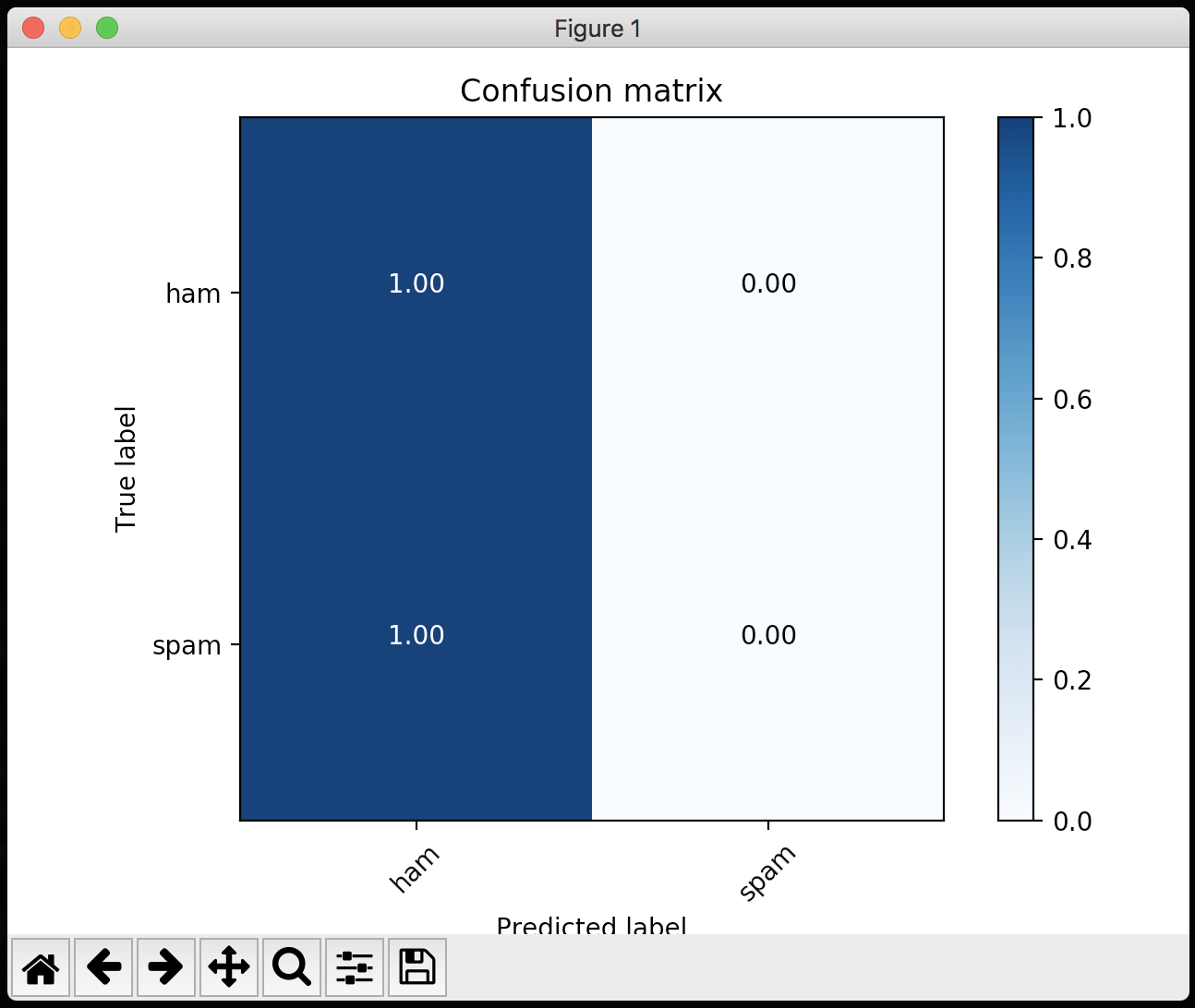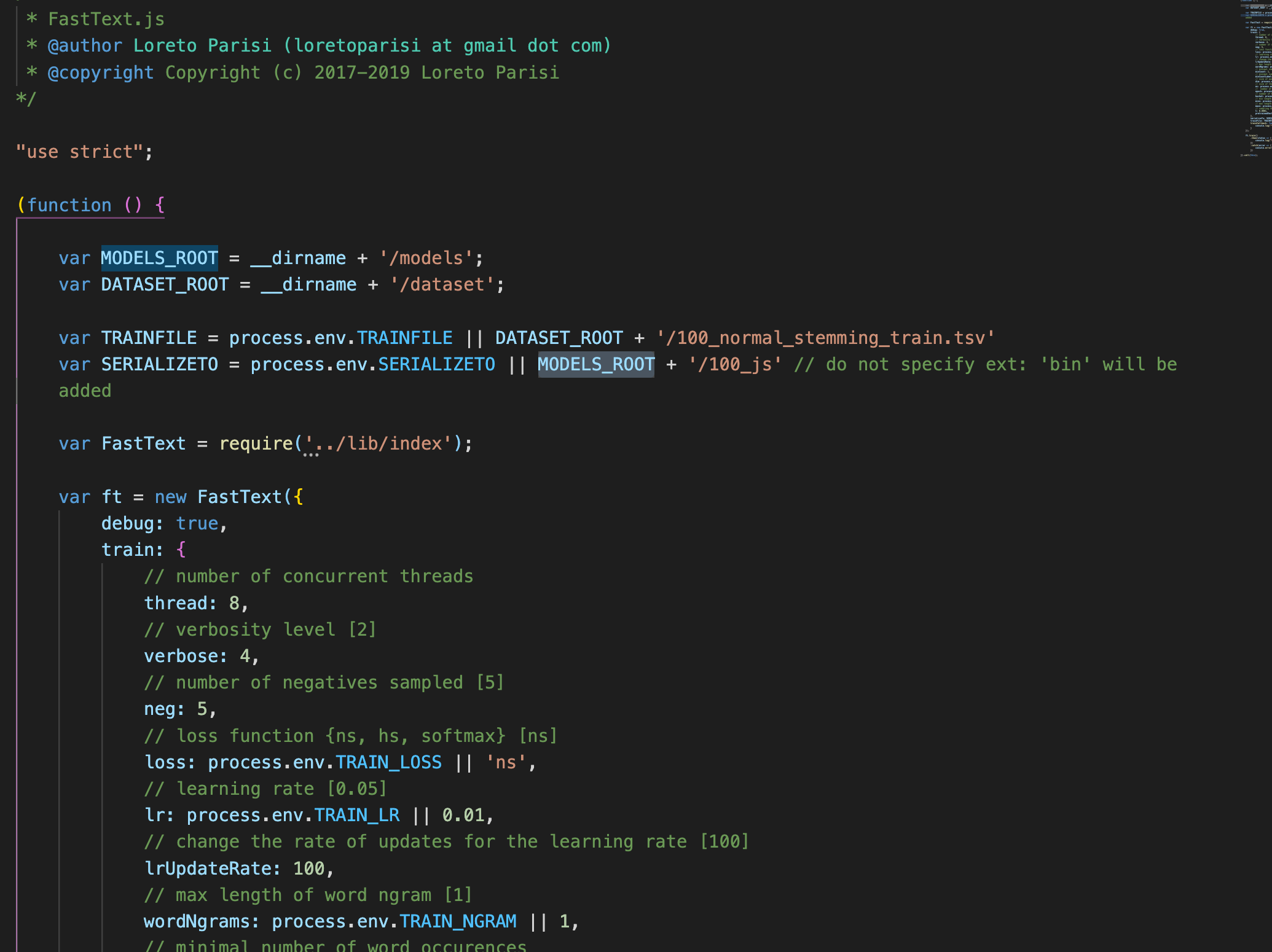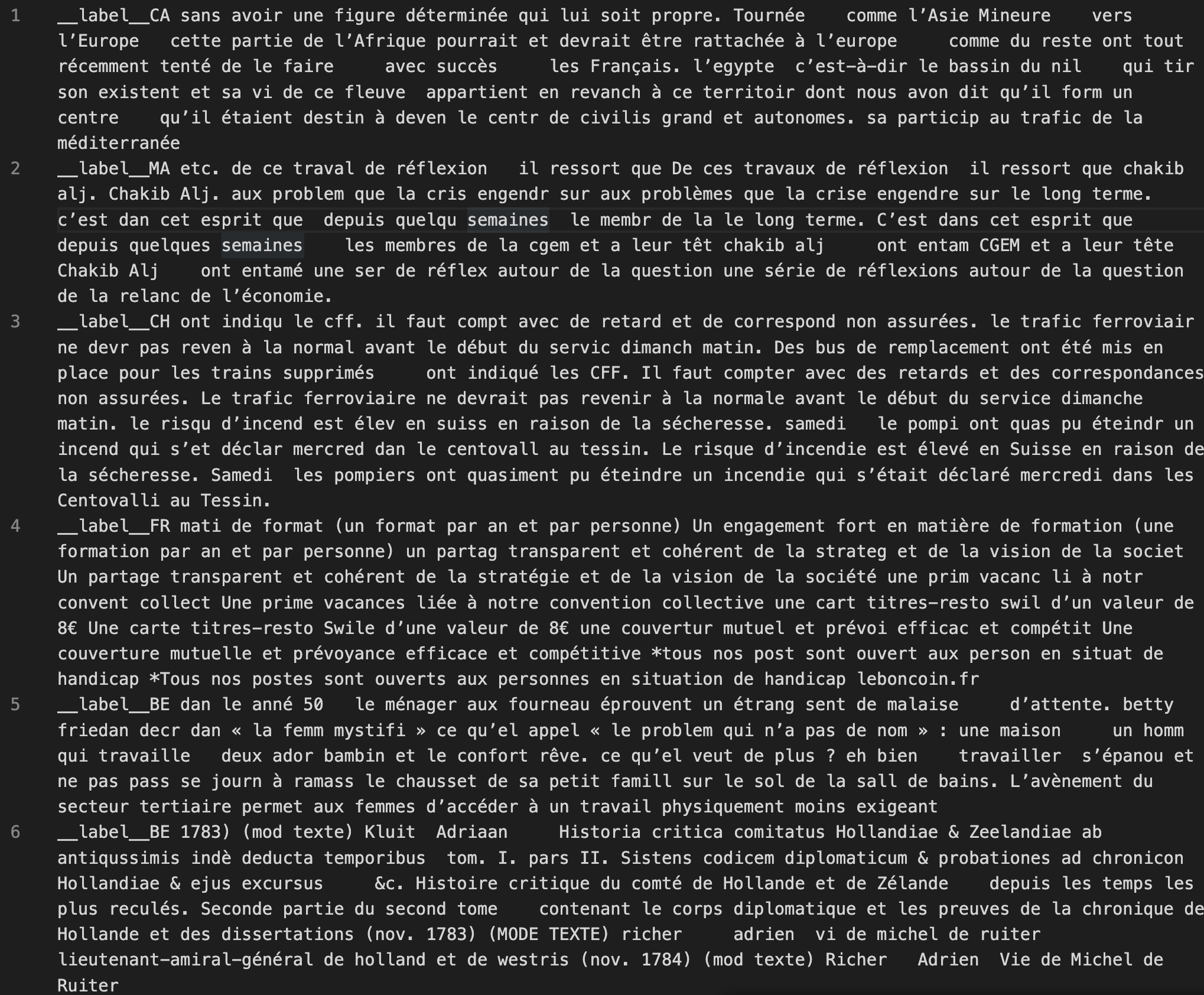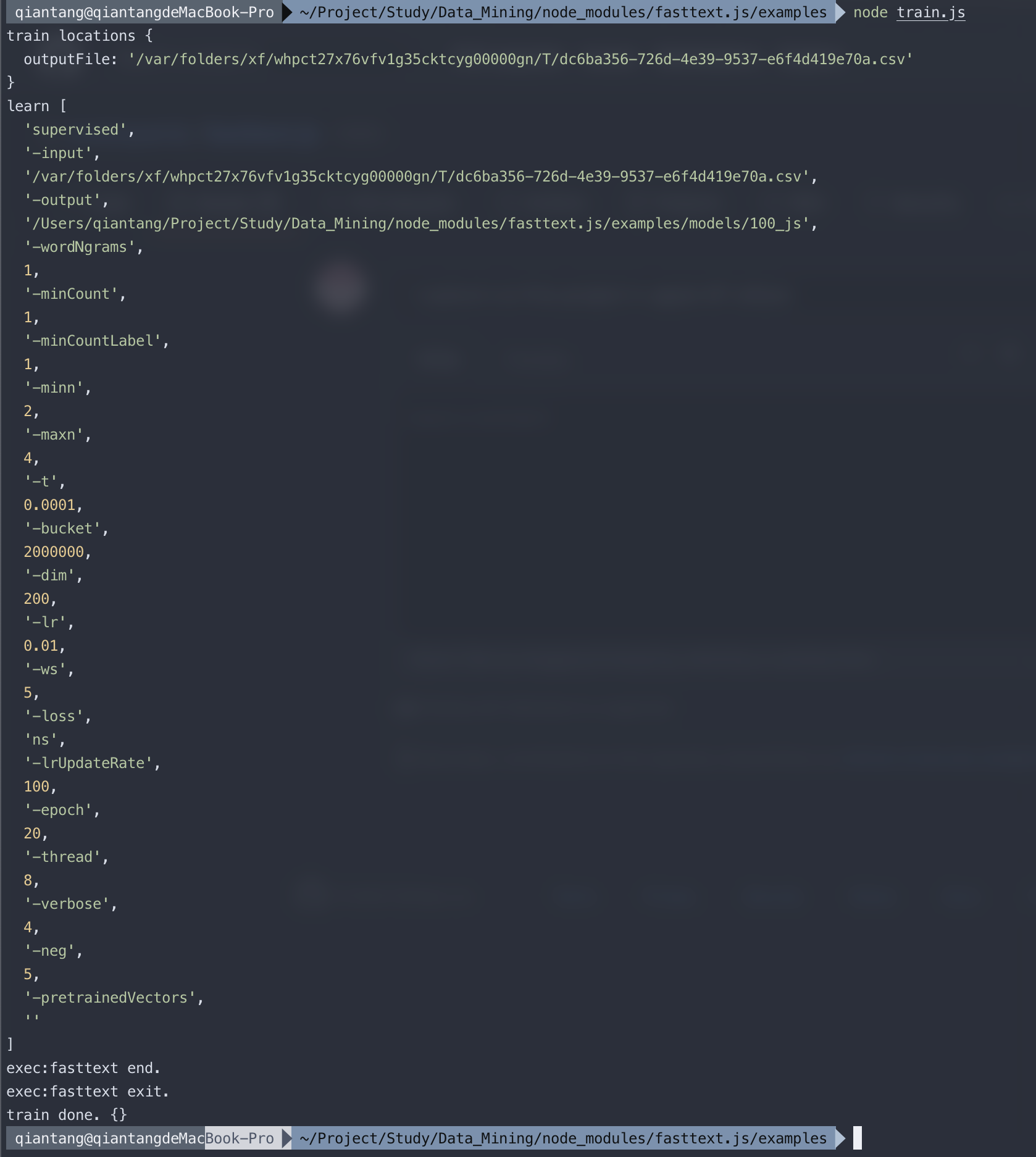FastText is a library for efficient learning of word representations and sentence classification. FastText is provided by Facebook Inc.
FastText.js is a JavaScript library that wraps FastText to run smoothly within node.
Added support for M1 Apple processor.
- FastText.js APIs
- How to Install
- How to Use
- Examples
- Training set and Test set format
- Datasets 🆕
- Models 🆕
- Other Versions – Supported Platforms
This version of FastText.js comes with the following JavaScript APIs
FastText.new(options)
FastText.load()
FastText.loadnn() [NEW API]
FastText.word2vec() [NEW API]
FastText.train()
FastText.test()
FastText.predict(string)
FastText.nn() [NEW API]git clone https://github.com/loretoparisi/fasttext.js.git
cd fasttext.js
npm installFastText.js is available as a npm module here. To add the package to your project
npm install --save fasttext.jsBuild the docker image
docker build -t fasttext.js .This will update the latest FastText linux binaries from source to lib/bin/linux.
Now running the image on the docker host binding the port 3000 it is possibile to run the server example:
docker build -t fasttext.js .
docker run --rm -it -p 3000:3000 fasttext.js node fasttext.js/examples/server.js To serve a different custom model a volume can be used and passing the MODEL environment variable
docker run -v /models/:/models --rm -it -p 3000:3000 -e MODEL=/models/my_model.bin fasttext.js node fasttext.js/examples/server.js
We provide a WASM compiled binary of FastText to be used natively NodeJS. Please check /wasm folder for library and examples. 🆕
You can specify all the train parameters supported by fastText as a json object
train: {
// number of concurrent threads
thread: 8,
// verbosity level [2]
verbose: 4,
// number of negatives sampled [5]
neg: 5,
// loss function {ns, hs, softmax} [ns]
loss: process.env.TRAIN_LOSS || 'ns',
// learning rate [0.05]
lr: process.env.TRAIN_LR || 0.05,
// change the rate of updates for the learning rate [100]
lrUpdateRate: 100,
// max length of word ngram [1]
wordNgrams: process.env.TRAIN_NGRAM || 1,
// minimal number of word occurences
minCount: 1,
// minimal number of word occurences
minCountLabel: 1,
// size of word vectors [100]
dim: process.env.TRAIN_DIM || 100,
// size of the context window [5]
ws: process.env.TRAIN_WS || 5,
// number of epochs [5]
epoch: process.env.TRAIN_EPOCH || 5,
// number of buckets [2000000]
bucket: 2000000,
// min length of char ngram [3]
minn: process.env.TRAIN_MINN || 3,
// max length of char ngram [6]
maxn: process.env.TRAIN_MAXN || 6,
// sampling threshold [0.0001]
t: 0.0001,
// load pre trained word vectors from unsupervised model
pretrainedVectors: process.env.WORD2VEC || ''
}To train the model you must specificy the training set as trainFile and the file where the model must be serialized as serializeTo. All the FastText supervised options are supported. See here for more details about training options. Note that serializeTo does not need to have the file extension in. A bin extension for the quantized model will be automatically added. You can use the pretrainedVectors option to load an unsupervised pre-trained model. Please use the word2vec api to train this model.
var fastText = new FastText({
serializeTo: './band_model',
trainFile: './band_train.txt'
});
fastText.train()
.then(done=> {
console.log("train done.");
})
.catch(error => {
console.error(error);
})To train an unsupervised model use the word2vec api. You can specify the words representation to train using word2vec.model parameter set to skipgram or cbow and use the train parameters as usual:
fastText.word2vec()
.then(done => {
})
.catch(error => {
console.error("Train error", error);
})It is possible to track the training progress using the callback parameters trainProgress in the options:
{
trainCallback: function(res) {
console.log( "\t"+JSON.stringify(res) );
}
}This will print out the training progress in the following format:
{
"progress":17.2,
"words":174796,
"lr":0.041382,
"loss":1.232538,
"eta":"0h0m",
"eta_msec":0
}that is the parsed JSON representation of fasttext output
Progress: 17.2% words/sec/thread: 174796 lr: 0.041382 loss: 1.232538 ETA: 0h 0m
where eta_msec represents the ETA (estimated time of arrival) in milliseconds.
So a typical progress will fire the trainCallback several times like
{"progress":0.6,"loss":4.103271,"lr":0.0498,"words":21895,"eta":"0h9m","eta_msec":540000}
{"progress":0.6,"loss":3.927083,"lr":0.049695,"words":21895,"eta":"0h6m","eta_msec":360000}
{"progress":0.6,"loss":3.927083,"lr":0.049695,"words":21895,"eta":"0h6m","eta_msec":360000}
{"progress":0.6,"loss":3.676603,"lr":0.049611,"words":26813,"eta":"0h5m","eta_msec":300000}
{"progress":0.6,"loss":3.676603,"lr":0.049611,"words":26813,"eta":"0h5m","eta_msec":300000}
{"progress":0.6,"loss":3.345654,"lr":0.04949,"words":33691,"eta":"0h4m","eta_msec":240000}
{"progress":1.2,"loss":3.345654,"lr":0.04949,"words":39604,"eta":"0h4m","eta_msec":240000}Until the progress will reach 100%:
{"progress":99,"loss":0.532964,"lr":0.000072,"words":159556,"eta":"0h0m","eta_msec":0}
{"progress":99,"loss":0.532964,"lr":0.000072,"words":159556,"eta":"0h0m","eta_msec":0}
{"progress":99,"loss":0.532392,"lr":-0.000002,"words":159482,"eta":"0h0m","eta_msec":0}
{"progress":100,"loss":0.532392,"lr":0,"words":159406,"eta":"0h0m","eta_msec":0}
{"progress":100,"loss":0.532392,"lr":0,"words":159406,"eta":"0h0m","eta_msec":0}NOTE. Please note that some approximation errors may occur in the output values.
To test your model you must specificy the test set file as testFile and the model file to be loaded as loadModel. Optionally you can specificy the precision and recall at k (P@k and R@k) passing the object test: { precisionRecall: k }.
var fastText = new FastText({
loadModel: './band_model.bin',
testFile: './band_test.txt'
});
fastText.test()
.then(evaluation=> {
console.log("test done.",evaluation);
})
.catch(error => {
console.error(error);
})The evaluation will contain the precision P, recall R and number of samples N as a json object { P: '0.278', R: '0.278' }.
If a train is called just before test the evaluation will contain the number of words W and the number of labels L as well as a json object: { W: 524, L: 2, N: '18', P: '0.278', R: '0.278' }:
fastText.train()
.then(done=> {
return fastText.test();
})
.then(evaluation=> {
console.log("train & test done.",evaluation);
})
.catch(error => {
console.error("train error",error);
})🆕 The api testLabels evaluate labels F1-Score, Recall and Precision for each label in the model.
var fastText = new FastText({
loadModel: './band_model.bin',
testFile: './band_test.txt'
});
fastText.testLabels()
.then(evaluation=> {
console.log("test-labels:",evaluation);
})
.catch(error => {
console.error(error);
})This will print out the values F1, P and R for each label.
[
{
"ham": {
"F1": "0.172414",
"P": "0.094340",
"R": "1.000000"
}
},
{
"spam": {
"F1": "0.950495",
"P": "0.905660",
"R": "1.000000"
}
}
]To inference your model with new data and predict the label you must specify the model file to be loaded as loadModel. You can then call the load method once, and predict(string) to classify a string. Optionally you can specify the k most likely labels to print for each line as predict: { precisionRecall: k }
var sample="Our Twitter run by the band and crew to give you an inside look into our lives on the road. Get #FutureHearts now: http://smarturl.it/futurehearts";
fastText.load()
.then(done => {
return fastText.predict(sample);
})
.then(labels=> {
console.log("TEXT:", sample, "\nPREDICT:",labels );
sample="LBi Software provides precisely engineered, customer-focused #HRTECH solutions. Our flagship solution, LBi HR HelpDesk, is a SaaS #HR Case Management product.";
return fastText.predict(sample);
})
.then(labels=> {
console.log("TEXT:", sample, "\nPREDICT:",labels );
fastText.unload();
})
.catch(error => {
console.error(error);
});A multi-label example will have a list of columns of labels marked by __label__ prefix
__label__sauce __label__cheese How much does potato starch affect a cheese sauce recipe?
FastText.js will automatically handle multiple labels in the dataset for training and testing, please run the multilabel.js example to test it out:
cd examples/
node multilabel.jsThe train() and test() will print out:
N 3000
P@1 0.000333
R@1 0.000144
Number of examples: 3000
exec:fasttext end.
exec:fasttext exit.
{ N: '3000', P: '0.000333', R: '0.000144' }while the testLabels api will print out the labels array:
[ '__label__equipment',
'__label__cast',
'__label__oven',
'__label__sauce',
'__label__indian',
'__label__breakfast',
'__label__chili',
'__label__spicy',
'__label__bread',
'__label__eggs',
'__label__baking',
...
and by labels scores:
F1-Score : 0.175182 Precision : 0.096000 Recall : 1.000000 __label__baking
F1-Score : 0.150432 Precision : 0.081333 Recall : 1.000000 __label__food-safety
F1-Score : -------- Precision : -------- Recall : 0.000000 __label__substitutions
F1-Score : -------- Precision : -------- Recall : 0.000000 __label__equipment
F1-Score : -------- Precision : -------- Recall : 0.000000 __label__bread
F1-Score : -------- Precision : -------- Recall : 0.000000 __label__chicken
F1-Score : -------- Precision : -------- Recall : 0.000000 __label__storage-method
F1-Score : -------- Precision : -------- Recall : 0.000000 __label__eggs
F1-Score : -------- Precision : -------- Recall : 0.000000 __label__meat
F1-Score : -------- Precision : -------- Recall : 0.000000 __label__sauce
F1-Score : -------- Precision : -------- Recall : 0.000000 __label__cake
F1-Score : -------- Precision : -------- Recall : 0.000000 __label__flavor
F1-Score : -------- Precision : -------- Recall : 0.000000 __label__freezing
...To get the nearest neighbor words for a given term use the nn api:
fastText.loadnn()
.then(labels=> {
return fastText.nn(text)
})
.then(labels=> {
console.log("Nearest Neighbor\n", JSON.stringify(labels, null, 2));
})
.catch(error => {
console.error("predict error",error);
});We provide some support tools and script.
To evaluate the Confusion Matrix of a model, please use the confusion.sh script provided in the tools/ folder. The script requires sklearn and matplotlib installed on the system:
$ cd tools/
$ ./confusion.sh
Usage: ./confusion.sh DATASET_FILE MODEL_FILE [LABEL_COLUMS, def:1] [LABEL_NORMALIZED, default|normalize, def:default] [PLOT, 0|1, def:0]You must specify the dataset file path that has been used to train the model and the model file path. If the label golumn is different than the first column, plese specify the LABEL_COLUMN column index. If the dataset must be normalized, having a different label prefix or no one, please use the value normalize:
cd examples/
node train
cd ..
cd tools/
./confusion.sh ../examples/dataset/sms.tsv ../examples/models/sms_model.bin 1 normalize 1If the dataset has the fasttext label prefix i.e. __label__, please set the parameter NORMALIZE_LABEL to default:
./confusion.sh ../examples/dataset/sms.tsv ../examples/models/sms_model.bin 1 defaultThe script will calculate the predictions against the dataset and build confusion matrix using sklearn
./confusion.sh ../examples/dataset/sms.tsv ../examples/models/sms_model.bin 1
Platform is Darwin
Normalizing dataset ../examples/dataset/sms.tsv...
Splitting 1 label colums...
Calculating predictions...
Calculating confusion matrix...
Test labels:1324 (sample)
['spam']
labels:{'ham', 'spam'}
Predicted labels:1324 (sample)
['ham']
Accuracy: 0.756797583082
[[1002 0]
[ 322 0]]
Confusion matrix
[[ 1. 0.]
[ 1. 0.]]and and visualize it using matplotlib:
A folder examples contains several usage examples of FastText.js.
$ cd examples/
$ node train.js
train [ 'supervised',
'-input',
'/var/folders/_b/szqwdfn979n4fdg7f2j875_r0000gn/T/trainfile.csv',
'-output',
'./data/band_model',
'-dim',
10,
'-lr',
0.1,
'-wordNgrams',
2,
'-minCount',
1,
'-bucket',
10000000,
'-epoch',
5,
'-thread',
4 ]
Read 0M words
Number of words: 517
Number of labels: 2
Progress: 100.0% words/sec/thread: 1853435 lr: 0.000000 loss: 0.681683 eta: 0h0m -14m
exec:fasttext end.
exec:fasttext exit.
train done.
task:fasttext pid:41311 terminated due to receipt of signal:null$ cd examples/
$ node test.js
test [ 'test',
'./data/band_model.bin',
'/var/folders/_b/szqwdfn979n4fdg7f2j875_r0000gn/T/trainfile.csv',
1 ]
Number of examples: 18
exec:fasttext end.
exec:fasttext exit.
test done.
task:fasttext pid:41321 terminated due to receipt of signal:null$ cd examples/
$ node predict.js
TEXT: our twitter run by the band and crew to give you an inside look into our lives on the road . get #futurehearts now http //smarturl . it/futurehearts PREDICT: BAND
TEXT: lbi software provides precisely engineered , customer-focused #hrtech solutions . our flagship solution , lbi hr helpdesk , is a saas #hr case management product . PREDICT: ORGANIZATIONWe run a model and serve predictions via a simple node http api. We first download the example hosted models:
cd examples/models
./models.shWe now run the server.js example that will create a http server. We can export the MODEL env that will point to the local pretrained model, and a optional PORT parameter were the server is going to listen (default PORT is 3000):
$ cd examples/
$ export MODEL=models/lid.176.ftz
$ node server.js
model loaded
server is listening on 3000Try this simple server api passing a text parameter like:
The server api will response in json format
{
"response_time": 0.001,
"predict": [{
"label": "BAND",
"score": "0.5"
},
{
"label": "ORGANIZATION",
"score": "0.498047"
}
]
}To run a prediction Command Line Interface, please specify the env MODEL of the model file to run and use the example script cli:
cd examples/
export MODEL=models/langid_model.bin
node cli
Loading model...
model loaded.
Welcome to FastText.js CLI
Type exit or CTRL-Z to exit
> hello how are you?
> [ { label: 'EN', score: '0.988627' },
{ label: 'BN', score: '0.000935369' } ]
> das is seher gut!
> [ { label: 'DE', score: '0.513201' },
{ label: 'EN', score: '0.411016' } ]
rien ne va plus
> [ { label: 'FR', score: '0.951547' },
{ label: 'EO', score: '0.00760891' } ]
exit
> model unloaded.In this example we use the fastText compressed languages model (176 languages) we host.
cd examples/
export MODEL=./data/lid.176.ftz
export PORT=9001
node serverand then
that will be correctly detected as KO:
{
"response_time": 0.001,
"predict": [{
"label": "KO",
"score": "1"
},
{
"label": "TR",
"score": "1.95313E-08"
}
]
}We train a langauge identification model from scratch. Please see in the examples/models folder.
The trainFile and testFile are a TSV or CSV file where the fist column is the label, the second column is the text sample. FastText.js will try to normalize the dataset to the FastText format using FastText.prepareDataset method. You do not have to call this method explicitly by the way, FastText.js will do for you. For more info see here.
We host some example datasets in order to train, test and predict FastText models on the fly. For more info how to download and work with datasets, please see in the examples/datasets folder.
We host some example pretrained models. For more info how to download and work with pretrained models, please see in the examples/models folder.
- FastText Python Package
- FastText for Windows
- Nodejs binding for fasttext representation and classification.
In this release FastText.js comes with precompiled binaries for linux, macOS and Windows in the lib/bin/ folder. The Windows version is a 64-bit compiled version. It requires the Visual C++ Redistributable for Visual Studio 2015 components. See here for more info about the Windows version.
To use an external binary version use the bin option to specify the executable absolute path:
var fastText = new FastText({
bin: '/usr/local/bin/fasttext'
loadModel: DATA_ROOT + '/sms_model.bin' // must specifiy filename and ext
});A executable not found in path error will be thrown if the executable has not been found in the specified path.
Precompiled binaries runs FastText natively. A node child_process spawn will fork a new FastText native process tu run at OS speed, manage the state, the errors and the output of the process to the JavaScript API.
For more info about FastText and FastText license see here.
I thank you the following devs that helped me to improve FastText.js








